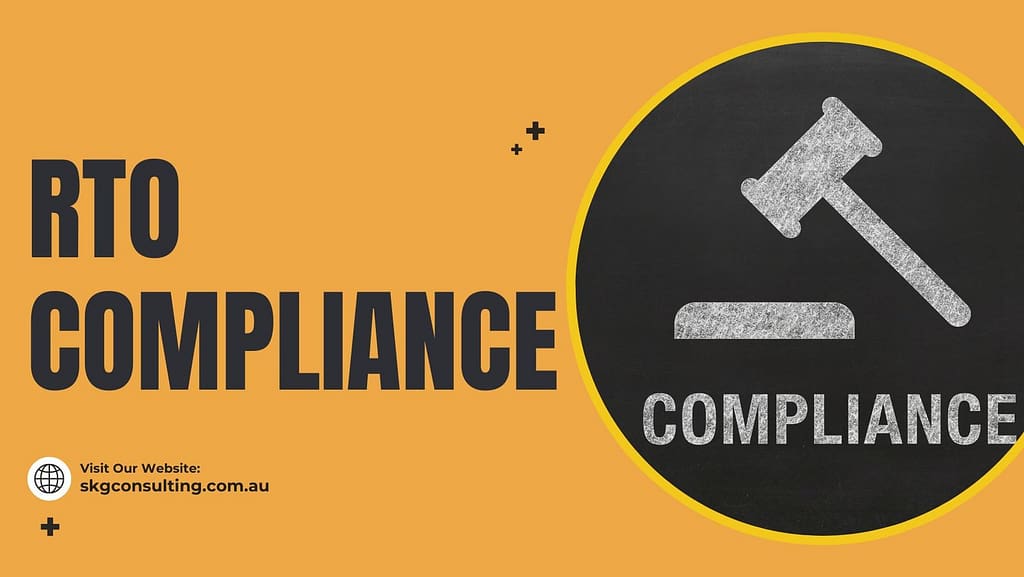- 530 Little Collins Street Melbourne 3000
- info@skgconsulting.com.au
- +61 409 983 643
- 530 Little Collins Street Melbourne 3000
- info@skgconsulting.com.au

Maintaining quality education and training standards within Registered Training Organisations (RTOs) in Australia is very important. As a consultancy services provider specialising in RTO compliance, we recognise the critical importance of adhering to the standards set by the Australian Skills Quality Authority (ASQA) and state training authorities.
Below, we have explored the essentials of RTO compliance, covering key areas such as training quality, assessment practices, governance, resources, and continuous improvement.
Whether you’re an established RTO or new to the regulatory landscape, we aim to provide valuable insights and solutions to ensure compliance excellence, ultimately benefiting learners and the industry.
RTO compliance refers to the adherence of Registered Training Organisations (RTOs) to the standards and regulations of the Australian Skills Quality Authority (ASQA) or relevant state training authorities.
It encompasses the measures and practices RTOs implement to ensure that their education and training services meet the required standards of quality, integrity, and legality.

Ensuring that the training provided by the RTO is of high quality and meets the standards set by industry and regulatory bodies. This involves designing and delivering relevant training programs that are engaging and effective in meeting the needs of learners.
Implementing fair, valid, and reliable assessment methods to evaluate learners’ competency and skills. Compliance in this area ensures that assessment practices align with industry standards and regulatory requirements, ensuring fairness and transparency for learners.
Maintaining effective RTO governance structures and administrative processes. This includes ensuring financial viability, accurate record-keeping, transparent reporting, and compliance with relevant laws and regulations governing education and training providers.
Providing adequate facilities, equipment, and resources to support training and assessment services delivery. Compliance in this area ensures that RTOs have the necessary infrastructure and resources to deliver quality education and training programs.
Ongoing monitoring, evaluation, and improvement of training and assessment practices. RTOs must continually review and update their programs and processes to adapt to changing industry needs, technological advancements, and regulatory requirements.
Fulfilling reporting requirements to regulatory authorities such as ASQA or state training authorities. This involves submitting accurate and timely reports on various compliance aspects, including financial performance, learner outcomes, and operational effectiveness.
Compliance ensures that training and assessment provided by RTOs meet the required standards of quality, ensuring that learners receive education and training that is relevant, effective, and of high quality.
Adhering to compliance standards enhances the credibility and reputation of RTOs. It instils trust among learners, employers, and industry stakeholders, leading to increased enrollment, partnerships, and opportunities.
RTOs must comply with the standards and regulations set by the Australian Skills Quality Authority (ASQA) or state training authorities. Non-compliance can result in penalties, fines, suspension, or revocation of registration.
Compliance is often a prerequisite for accessing government funding, grants, and support programs to improve vocational education and training. Compliance also opens doors to partnership opportunities with government agencies and industry bodies.
Compliance ensures that learners receive education and training that equips them with the skills and knowledge needed to succeed in their chosen fields. It ensures fairness, transparency, and reliability in assessment practices, leading to better learner outcomes.
Compliance helps RTOs stay aligned with industry standards and practices, ensuring that training programs are relevant and up-to-date with the evolving needs of the workforce. This fosters smoother transitions for learners into the workforce and enhances employability.
RTO compliance ensures that Registered Training Organisations (RTOs) maintain high education and training standards, improving learning outcomes and learner satisfaction. Additionally, compliance instils confidence among stakeholders, including learners, employers, and industry partners, in the quality and credibility of the RTO’s programs and services.

Compliance enhances the credibility and reputation of Registered Training Organisations (RTOs), positioning them as trusted education and training providers within their industries and communities. This credibility attracts more learners and fosters partnerships with industry stakeholders, opening doors to new opportunities for collaboration and growth.

Adhering to compliance standards ensures that RTOs meet legal obligations and mitigate the risk of penalties, fines, or loss of registration due to non-compliance. Compliance also helps RTOs navigate complex regulatory frameworks and stay updated on legislation or industry standard changes that may impact their operations.

RTO compliance ensures regulatory adherence, access to crucial funding, and vocational education and training support mechanisms. Meeting compliance standards, such as those set by the Australian Skills Quality Authority (ASQA) or state training authorities, allows RTOs to qualify for government funding, grants, and support programs.

To maintain RTO compliance, SKG Consulting encompasses a range of proactive strategies and solutions to streamline compliance processes and optimise organisational performance.
Non-compliance may result in legal penalties, fines, or sanctions imposed by regulatory authorities such as the Australian Skills Quality Authority (ASQA) or state training authorities. Penalties can vary depending on the severity and frequency of non-compliance, potentially leading to financial losses and reputational damage for the RTO.
Severe or repeated non-compliance may result in suspension or revocation of the RTO’s registration, prohibiting it from delivering accredited training and assessment services. Loss of registration can have far-reaching consequences, including revenue loss, closure of operations, and tarnishing the RTO’s reputation.
Non-compliance can compromise the quality and integrity of education and training provided to learners, affecting their learning outcomes and prospects. Learners may receive substandard education or assessment practices, which can lead to dissatisfaction, disengagement, and diminished confidence in the RTO’s services.
Non-compliance may necessitate corrective actions, remediation efforts, or procedural changes within the RTO, causing operational disruption and resource allocation challenges. The time and resources required to address non-compliance issues can divert attention from core business activities and strategic objectives.
Non-compliance may disqualify the RTO from accessing government funding, grants, or support programs to improve vocational education and training. Losing financial support can hinder the RTO’s ability to invest in program enhancements, infrastructure upgrades, and capacity-building initiatives.
RTO compliance is pivotal for maintaining quality education and training standards within Registered Training Organisations (RTOs) in Australia.
By adhering to the standards set by the Australian Skills Quality Authority (ASQA), RTOs ensure integrity, legality, and excellence in their operations.
At SKG Consultancy Services, we understand the critical importance of compliance and offer tailored solutions to assist RTOs in effectively fulfilling their compliance obligations.
From comprehensive audits to customised training programs and continuous support, we empower RTOs to uphold the highest standards of quality and professionalism.
We also provide RTO Registration services to help organisations achieve and maintain their registered status seamlessly.
530 Little Collins Street Melbourne 3000
+61 409 983 643
info@skgconsulting.com.au